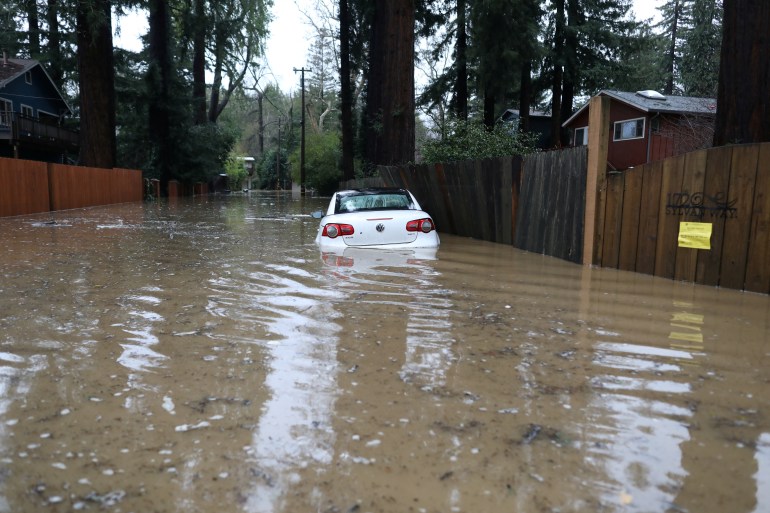The latest system was expected to bring “heavy lower-elevation rain, significant mountain snow, and strong winds,” with “another surge of Pacific moisture” expected on Monday, the National Weather Service (NWS) said.
It predicted “disastrous flooding” across the lower Salinas River valley, a key agricultural region south of San Francisco Bay.
Late on Saturday, Biden “declared that a major disaster exists in the State of California and ordered Federal aid to supplement State, tribal, and local recovery efforts in the areas affected by severe winter storms, flooding, landslides, and mudslides”, the White House said in a statement.
“Assistance can include grants for temporary housing and home repairs, low-cost loans to cover uninsured property losses, and other programmes to help individuals and business owners recover from the effects of the disaster,” the statement said.
“Federal funding also is available to State, tribal, and eligible local governments and certain private nonprofit organizations on a cost-sharing basis for emergency work in the counties of Merced, Sacramento, and Santa Cruz.”
Thank you, @POTUS for having the back of Californians as we continue to be impacted by intense winter storms.
Serious winds and rain are still anticipated throughout the state. Stay safe and remain vigilant. https://t.co/V2DcoKuv0U
— Gavin Newsom (@GavinNewsom) January 15, 2023
At least 19 people are known to have died from storm-related causes in the last three weeks.
Among them were drivers found in submerged cars, people struck by falling trees, and a husband and wife killed in a rockfall.
Rising waters and unsuitable conditions resulted in a halt in the search for five-year-old Kyle Doan, who was swept away in floodwaters as his mother tried to pull him to safety from their car, the San Luis Obispo County Sheriff’s office said on Saturday.

In Spreckels, a community a few hundred metres from the Salinas river, most residents had opted not to evacuate despite warnings from authorities.
“It looks like we might have missed kind of the worst of it,” Robert Zagajeski, out walking his dog under a light rain, told the AFP news agency.
A few kilometres away, 30-year-old farm worker Erick Diaz watched the flooded fields from his home near the river. Despite evacuation orders, he too had remained.
“I have nowhere to go and, for the moment, everything is fine,” he said.
Floodwaters from the rising San Lorenzo River, which cuts through the town in the Santa Cruz Mountains, inundated Felton Grove, triggering emergency evacuations.
Rubbish bins were seen floating down streets, with water levels reaching stop signs and overtaking parked vehicles.
‘Not done’
Nearly 26 million Californians remained under a flood watch on Saturday evening, according to the NWS, with tens of thousands under evacuation orders and advisories.
“The reality is that this is just the eighth of what we anticipate will be nine atmospheric rivers – we’re not done,” California Governor Gavin Newsom said at a briefing with local leaders where he urged people to be vigilant about safety for the next 24 to 48 hours.
“This is happening all across California but I want to say … you guys are disproportionately taking the brunt of it, and if you feel that way you’re right,” Newsom added.

The storms of recent weeks were originally welcomed – coming after years of drought – but by now have brought “disastrous” flooding, officials have said.
“This place was hit hard by the drought over the past years,” 58-year-old farm worker Manuel Paris told AFP near Salinas. “We’re not used to this much rain any more.”
The NWS said another 5.0 to 7.5 centimetres (two to three inches) could cause new flooding and mudslides, with parts of the Sierra Nevada seeing 90 to 180cm of snow (three to six feet), and strong winds buffeting central and coastal California at up to 80km/h (50 mph).
More than 68,000 utility customers were without electricity on Saturday morning, a number that was cut by more than half during the afternoon, according to poweroutage.us.
